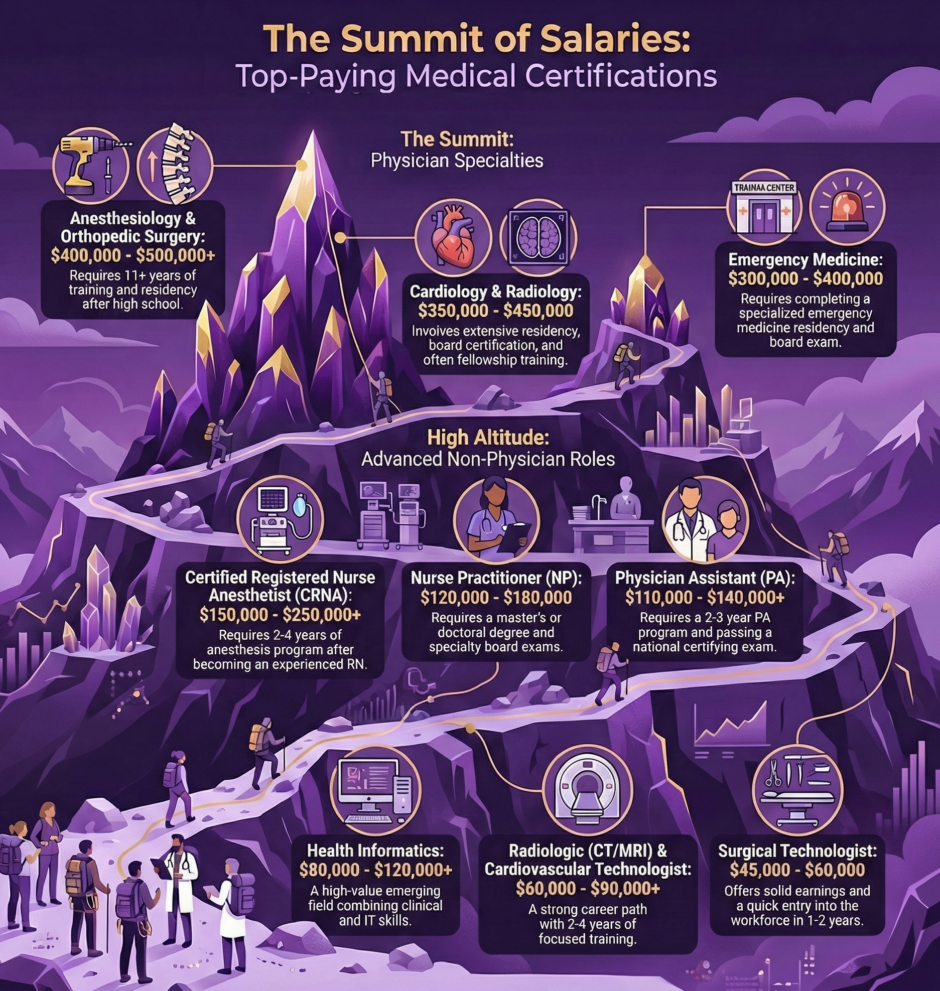If you’re considering a career in healthcare or looking to advance your current position, you’ve probably wondered about the financial side of medical certifications. It’s a practical question that deserves a straightforward answer, which credentials will give you the biggest return on your investment of time, money, and effort?
The short answer? It depends on your current education level, career goals, and how much time you’re willing to invest. But let’s dive deeper into the landscape of medical certifications and their earning potential.
Highest-Paying Medical Certifications
Before we talk numbers, it’s important to understand what we mean by “medical certification.” In healthcare, there are several different types of credentials, each with varying requirements and earning potential.
Firstly, you have professional licenses, which are mandatory credentials required to practice in specific roles. Think registered nurse (RN) licenses or physician licenses. Secondly, there are specialty certifications, which are typically voluntary but highly valued credentials that demonstrate expertise in a particular area. Thirdly, there are educational certifications that might be required for certain positions but aren’t necessarily tied to direct patient care.
The highest-paying medical certifications generally fall into two categories:
- Those that require extensive education and training (like becoming a physician)
- Those that represent specialized skills in high-demand areas

The Heavy Hitters: Physician Specialties
Let’s start with the obvious winners. Medical doctors consistently earn the highest salaries in healthcare, but not all medical specialties are created equal when it comes to compensation.
- Anesthesiology typically tops the charts, with anesthesiologists earning median salaries well into the $400,000-$500,000 range annually. The certification process is rigorous, requiring four years of medical school, a four-year anesthesiology residency, and passing the American Board of Anesthesiology exam. The high pay reflects the critical nature of the work and the extensive liability involved.
- Orthopedic Surgery follows closely behind, with orthopedic surgeons often earning similar amounts. The path here is even longer, requiring medical school, a five-year orthopedic surgery residency, and often additional fellowship training. Board certification through the American Board of Orthopaedic Surgery is essential.
- Cardiology and Radiology also command impressive salaries, typically in the $350,000-$450,000 range. Both require completion of internal medicine residency (for cardiology) or diagnostic radiology residency, followed by board certification and often fellowship training.
- Emergency Medicine physicians earn substantial salaries, usually ranging from $300,000-$400,000 annually. The certification process involves completing an emergency medicine residency and passing the American Board of Emergency Medicine exam.
High-Paying Non-Physician Certifications
If you’re not interested in the decade-plus commitment required to become a physician, there are still several medical certifications that offer impressive earning potential.
- Certified Registered Nurse Anesthetist (CRNA) is often considered the holy grail of nursing certifications. CRNAs can earn $150,000-$200,000 or more annually, with some earning well over $250,000 in certain markets. The path requires becoming a registered nurse first, gaining critical care experience, then completing a 2-4 year nurse anesthesia program and passing the national certification exam. While it’s a significant commitment, it’s much shorter than the physician route.
- Nurse Practitioner (NP) certifications in certain specialties can also be quite lucrative. Psychiatric Mental Health NPs, for example, often earn $120,000-$180,000 annually, with some earning more in private practice. The certification requires completing a master’s or doctoral NP program and passing specialty board exams.
- Physician Assistant (PA) certification offers strong earning potential, with median salaries typically ranging from $110,000-$140,000, though specialty PAs can earn significantly more. The path involves completing a PA program (usually 2-3 years) and passing the Physician Assistant National Certifying Exam (PANCE).
Specialized Technical Certifications
Some of the highest-paying medical certifications are in specialized technical fields that require specific expertise but may not require as extensive general medical training.
- Cardiovascular Technologist certifications, particularly those specializing in invasive cardiology, can lead to salaries in the $60,000-$90,000 range, with experienced technologists in specialized areas earning more.
- Surgical Technologist certifications can provide solid middle-class earnings, typically $45,000-$60,000, with opportunities for advancement and specialization.
- Radiologic Technologist certifications offer good earning potential, especially with additional specializations. CT and MRI technologists often earn $60,000-$80,000 or more, depending on location and experience.
The Location Factor
It’s crucial to understand that medical salaries vary dramatically by geographic location. A CRNA earning $180,000 in rural Alabama might need to earn $250,000 in San Francisco to maintain the same standard of living. Urban areas and regions with physician shortages often offer higher salaries to attract qualified professionals.
States like California, New York, and Massachusetts tend to offer higher salaries across all medical professions, but they also have higher costs of living. Meanwhile, rural areas in states like Montana, Wyoming, or the Dakotas might offer surprisingly competitive salaries when adjusted for cost of living, plus loan forgiveness programs.
The Time-to-Earning Equation
When evaluating medical certifications, consider the time-to-earning ratio. While physicians earn the most, they also spend the most time in training. A surgical technologist might start earning $45,000 after 1-2 years of training, while a surgeon won’t start earning their $400,000 salary until they’re in their early 30s.
For someone looking to maximize earning potential quickly, certifications like EMT-Paramedic (1-2 years), Surgical Technologist (1-2 years), or Radiologic Technologist (2-4 years) might make more sense than longer programs.
Emerging High-Value Certifications
The healthcare landscape is constantly evolving, and some newer certifications are showing impressive earning potential.
- Health Informatics certifications are becoming increasingly valuable as healthcare systems digitize. Professionals with both clinical background and IT skills can earn $80,000-$120,000 or more.
- Genetic Counseling certification requires a master’s degree but leads to median salaries around $80,000-$100,000, with growth expected as genetic testing becomes more common.
- Clinical Research Coordinator certifications can lead to salaries in the $50,000-$70,000 range, with opportunities for advancement in the growing clinical research field.
The ROI Calculation
When considering which medical certification pays the most, don’t just look at the final salary number.
Consider the total return on investment, including:
- Time to complete training
- Cost of education and certification
- Opportunity cost of not working during training
- Job availability in your area
- Long-term career growth potential
- Work-life balance considerations
A certification that takes two years and costs $30,000 but leads to a $70,000 salary might have better ROI than one that takes eight years and costs $200,000 but leads to a $300,000 salary, depending on your personal situation.
Making the Decision
The medical certification that pays the most for you depends on your current situation, career goals, and personal preferences. If you’re willing to invest a decade or more in training and can handle the academic rigor, physician specialties offer the highest earning potential. If you want to enter the workforce sooner with good earning potential, consider certifications like CRNA, NP, or PA.
 For those interested in technology and healthcare, emerging fields like health informatics offer promising opportunities. And don’t overlook traditional roles like radiologic technologist or surgical technologist, which offer solid middle-class earnings with reasonable training requirements.
For those interested in technology and healthcare, emerging fields like health informatics offer promising opportunities. And don’t overlook traditional roles like radiologic technologist or surgical technologist, which offer solid middle-class earnings with reasonable training requirements.
Remember that the “highest paying” certification isn’t always the best choice. Consider factors like job satisfaction, work-life balance, patient interaction, and career stability. A certification that pays well but makes you miserable isn’t worth pursuing.
The healthcare field offers numerous pathways to financial success, each with its own requirements and rewards. The key is finding the one that aligns with your goals, abilities, and life circumstances. Whether you choose the long road to becoming a physician or a shorter path to a specialized certification, the healthcare field offers some of the most financially rewarding and personally fulfilling career opportunities available today.
Take time to research specific programs in your area, talk to professionals currently working in fields that interest you, and honestly assess your own capabilities and commitment level. The investment in medical certification can pay dividends for decades to come, but only if you choose the right path for your unique situation.

